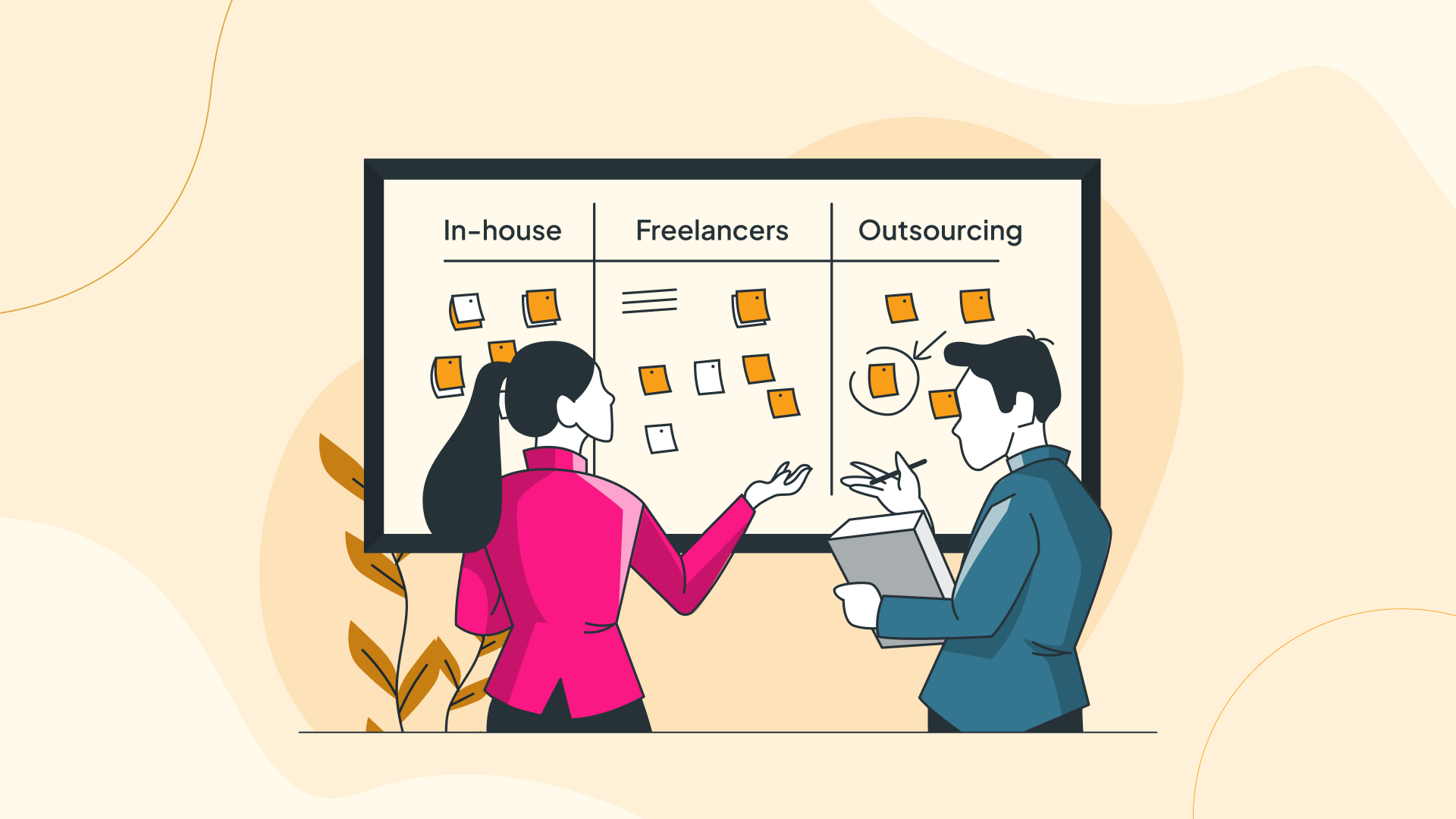
Every startup kickstarts its mission with a clear vision and enthusiasm fuelled by a passion for bringing innovative change. Everything from understanding the market & the customer, raising funds & managing finances, setting up the team & culture, coming up with a GTM strategy, scaling sales & marketing, putting together partnerships, and customer success & support are challenges that have to be dealt with almost parallelly.
Most of these startups struggle at these points. But let’s be honest; product development for tech startups is probably the most challenging and takes the most amount of time and effort at the early stages.
What makes product development challenging?
Building a successful product starts with understanding the pain points of the target audience, the characteristics and behavior patterns of your ideal customer, and the probable solutions to these pain points.
You already have a great idea as a solution for all those problems. You do market research, and go through articles and data that are already available to understand whether it can really solve the problem and whether there are probable alternatives out there. You also will need to ask your users directly what they feel.
Some people envision the complete product and go building it all out from here. But most people build out a minimal version of the product or mocks of the product and do short advancing iterations from feedback they receive. But whichever way you choose you need to build out a tech team that is continuously in sync with you and your team, constantly building and supporting you.
Building a team for tech product development

Great things happen when diverse talents assemble. For tech product development, the number one thing you need is a versatile team of experts. A team brings skills from each area of expertise from conducting user research, defining product requirements, determining the minimum viable product (MVP), planning release milestones, designing the user experience (UX), and user interface (UI), creating a scalable software architecture, selecting the right technical stack, to ensuring quality.
Getting people with a plethora of skill sets ranging from Product Managers, Product Designers, Product Architects, to frontend, backend, mobile, data, AI, QA, & DevOps engineers at the right time is in itself a pain. Hiring them and getting them on time is not easy as good tech talent is scarce. There is a lot of difference between an average one and a good one, so there is no option to be lenient on quality here. Attrition also adds fuel to the fire.
But the real pain is to have them functioning as a great tech team. Most probably each of them comes from different companies with different cultures, standards, processes, and guidelines and has used different tools, libraries and technologies. They need to transform into a great tech team – understand the vision, understand what they are trying to build, start trusting each other, build a great culture and come up with the right way of doing things that works best for your startup.
A great team builds great products that are a joy to use, reliable, scalable (functionally as well as technically), secure, and are easily maintainable. They ensure your product is deployed smoothly and other intricacies are managed wisely. They are agile and are able to quickly fix teething issues, recover at seed and support you throughout.
But, the question is, how do you build such a great team? Here are three approaches to building a product development team.
1.In-house team of skilled professionals from scratch
Setting up a team is exciting. You get to meet many skilled, experienced, and creative people. As a startup, you enjoy networking with similar-minded professionals. Plus, hiring each member of the team gives you complete control over who comes to your team and you have an edge over the collaborative workflow which is the spine of an organization.
But, here comes the reality.
This method is challenging and painful. Instead of getting hands-on with the product development, your focus shifts to building a team. There is nothing wrong with building a team rather it helps you as a startup. But, the challenges that come along with it will drain your resources.
Building and maintaining a talented engineering team requires extensive effort in recruitment and training. Additionally, providing infrastructure, defining processes, and managing human resources can distract you from the core processes of running your business and building your idea.
In the rapidly changing startup ecosystem, hiring experts swiftly based on changing business needs is challenging, and time is often limited.
2.Hiring freelancers for product development
Finding the right professional on freelance terms is quite easy these days. There are several skilled software developers and engineers available for short contracts which would work perfectly for your needs. They mostly work remotely and they are quite comfortable and efficient to do so. But, is it?
Hiring a freelancer might indeed seem a viable option at first look, but how about the operation hurdles? Freelancers work out of their schedules. Even though they are good at working remotely, a collaborative environment is sacrificed with this method.
Project management concepts can go out the window, and there's no guarantee that freelancers will complete their work on time, especially if they have multiple clients. Let’s not forget the probabilities of disputes that can also be more challenging to handle.
3.Outsourcing to a tech product development studio
This is where you partner with a reputable product development company. You work closely with a team of professionals who work in a collaborative environment. They have hands-on experience in solving problems. You trust not individuals but an organization with your idea. So, you can relax and focus on progressing through the right track while your product development is handled safely.
Product development studios have specialists that can handle different processes involved in product development effortlessly from user research to DevOps and even sales. They are able to scale up or down on demand and provide you with the right engineers at the right time. But more than all this they give you a team and not just a bunch of engineers.
With this, you are driving your resources to the crucial elements of your business while leveraging the expertise of another organization.
What to choose for tech product development?

With these options in mind, it's essential to make a wise choice. While you can determine the best approach through in-depth analysis, business leaders should focus on creating the product's strategy, establishing networks, and evaluating product-market fit. Ultimately, leave product development to professionals.
The success of your business lies in partnering with organizations and getting your product ready on time. Continue your journey while the experts build your product efficiently and affordably. This is why outsourcing is the best option for product development.
Hiring freelancers is probably the least recommended option. In practice, you feel you make a lot of progress initially but eventually get a product that is not consistent starting from the UX to the codebase. In almost all cases you end up with something that you eventually need to completely throw out and start afresh. But you can’t since you already have users using your software that works a certain way. Therefore, it’s advisable to explore other alternatives before deciding on this approach.
The comprehensive journey of outsourced product development
Outsourcing product development to a studio combines a structured and collaborative process. Your idea is developed efficiently while you focus on your
core business. Here are the processes involved in product development when you outsource the project to a company:
- Initial consultation & requirement gathering
The process begins with comprehensive discussions between your team and the product development team of the outsourcing partner to understand the scope of the project, objectives, and target audience. This phase communicates your vision, the core features, and the technical specifications of the product.
- Site visits
To ensure effective communication and a deeper understanding of your business, the outsourcing partner may arrange site visits. Their team visits your company to gain firsthand knowledge of your operations, culture, and long-term goals. This strengthens collaboration and ensures they can align their development approach with your business vision.
- Alignment of the team
After gathering the necessary information, the outsourcing company ensures that the right team is assembled, with experts in areas such as design, development, and marketing. The team is aligned with your business goals, ensuring everyone is working towards a shared vision.
- User research
The outsourced team conducts thorough research to understand your target audience’s pain points, needs, and behaviour. This helps guide product development and ensures the final product solves real-world problems for users.
- Ideation
Based on the research, the team brainstorms and generates ideas to address the identified user needs. They work closely with your team to refine and prioritize these ideas, ensuring they align with business objectives.
- Prototyping
The next step is to create prototypes or mockups that visualize the product’s core features and functionality. These prototypes allow you to see the product taking shape and offer feedback early in the process.
- Validation of ideas
The prototypes are validated with stakeholders and sometimes even with real users to gather feedback. This ensures that the product concept meets user expectations and business goals before moving into full development.
- Refinement
Based on the feedback received, the team refines the product’s design and functionality, ensuring that the final version is aligned with user needs and business objectives. This step helps avoid costly changes later in development.
- Setting up architecture, tech stack, processes & guidelines
The product architect along with the team has to define the data architecture, frontend, backend & mobile high level and low level designs, architecture patterns, tech stack and tools, deployment architecture and guidelines, coding, branching, release & environment guidelines.
- Product management
Throughout the process, a dedicated product manager oversees the development and strategy, ensuring that the product vision, market fit, and key objectives are aligned. They act as the liaison between your team and the outsourced team, driving product decisions, prioritizing features, and ensuring that the product meets both customer needs and business goals.
- Development & testing
Once the refined product concept is approved, full development begins. The outsourced team works in iterative cycles (often using agile methodologies), building the product feature by feature. Rigorous testing is conducted at each stage to ensure quality, performance, and security.
- Sales and marketing support
In some cases, the outsourcing partner can also assist with sales and marketing strategy. This includes helping with market positioning, crafting go-to-market plans, and ensuring that the product reaches the intended audience effectively.
- Deployment & maintenance
After the product is developed and tested, the outsourcing team handles deployment, ensuring a smooth launch on your chosen platform. Post-launch, they provide ongoing support, maintenance, and updates to keep the product running smoothly and meeting new demands.
- Ongoing collaboration & feedback
Even after the product is launched, the collaboration doesn’t stop. Continuous feedback from users and stakeholders is used to make iterative improvements, ensuring the product evolves with market needs.
Advantages of outsourcing product development
Outsourcing product development offers several benefits, especially for startups aiming to build a successful product while staying focused on their larger mission.
- All-in-one solution: Partnering with a software agency that provides end-to-end services, including user research, MVP development, UX/UI design, technical stack selection, quality assurance, and DevOps. This ensures a smooth and secure development process.
- Instant expertise: No need for hiring, training, or investing in infrastructure. The agency provides experienced professionals, and the team can be scaled up or down as needed, ensuring flexibility and faster decisions.
- High quality & commitment: Trusted development partners deliver top-quality work, aiming to exceed expectations and build long-term relationships.
- Industry experience: Development agencies often have experience in similar projects and can offer valuable insights to enhance your product.
- Time to market: Outsourcing allows startups to speed up the development process, enabling faster delivery of products to the market enabling them to capitalize on opportunities and stay ahead of competitors.
- Scalability: Outsourced development offers the flexibility to adjust resources based on project demands. This helps them to efficiently scale their development efforts by allocating the right resources, leading to a smooth yet cost-effective delivery process.
Think startup, do startup
For every startup, building a successful software product is a journey filled with challenges, but it's also one of the most rewarding experiences for any entrepreneur. While you may have the vision and passion to drive your product forward, collaborating with a professional, dedicated software development team can turn your ideas into reality with precision and expertise.
Outsourcing product development is not just a cost-effective solution, it's a strategic move that allows you to focus on what you do best in spearheading your startup toward growth and market success. By partnering with a reliable software development studio, you gain access to professionals with a wealth of experience, cutting-edge technologies, increased flexibility, quicker time to market, risk reduction, and a team that is committed to your product's success as much as you are; all while saving a significant amount of time and money.
Let the experts handle the complexities of product development, so you can focus on contributing to a greater cause; your IDEA!
Ready to turn your idea into reality?
With over 8 years of industry experience and a team of 400+ expert engineers, KeyValue turns startup ideas into successful tech products. We offer end-to-end solutions, from user research to full-scale development, all with an AI-first approach that aligns with your business goals. Let us take care of the product development process, so you can focus on scaling your startup.
Get in touch with us today for a consultation, or explore our services to see how we can help your product thrive in the market.

